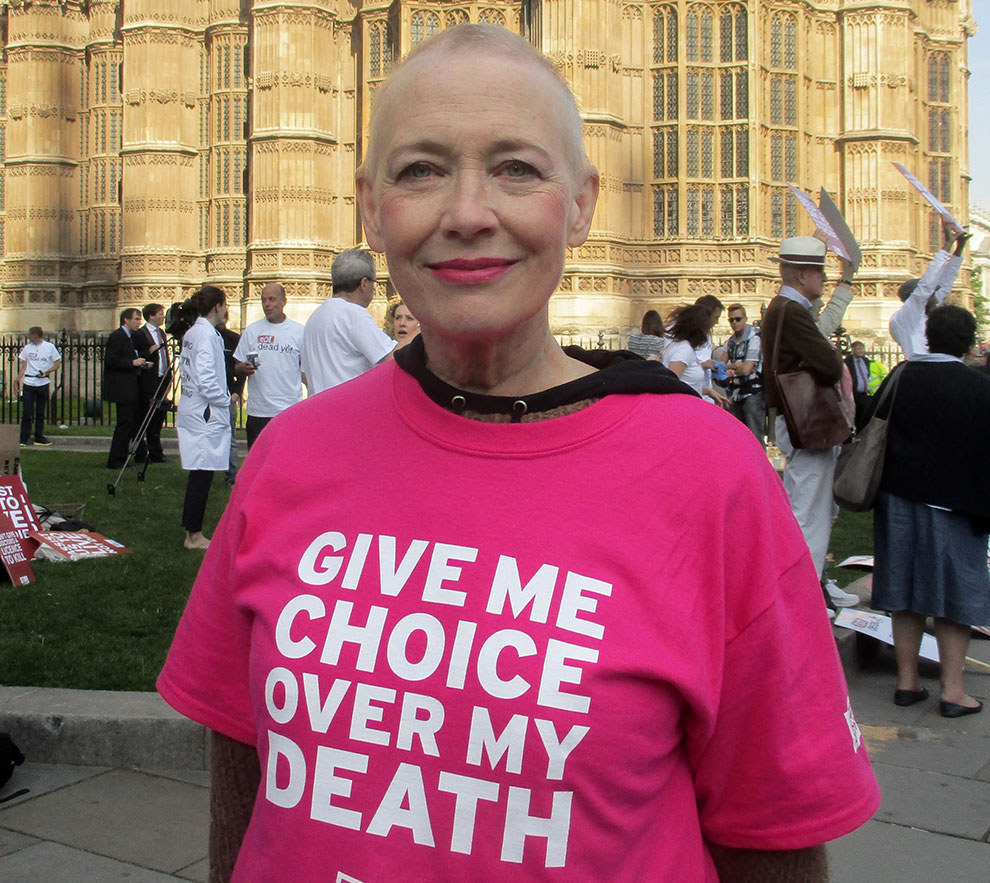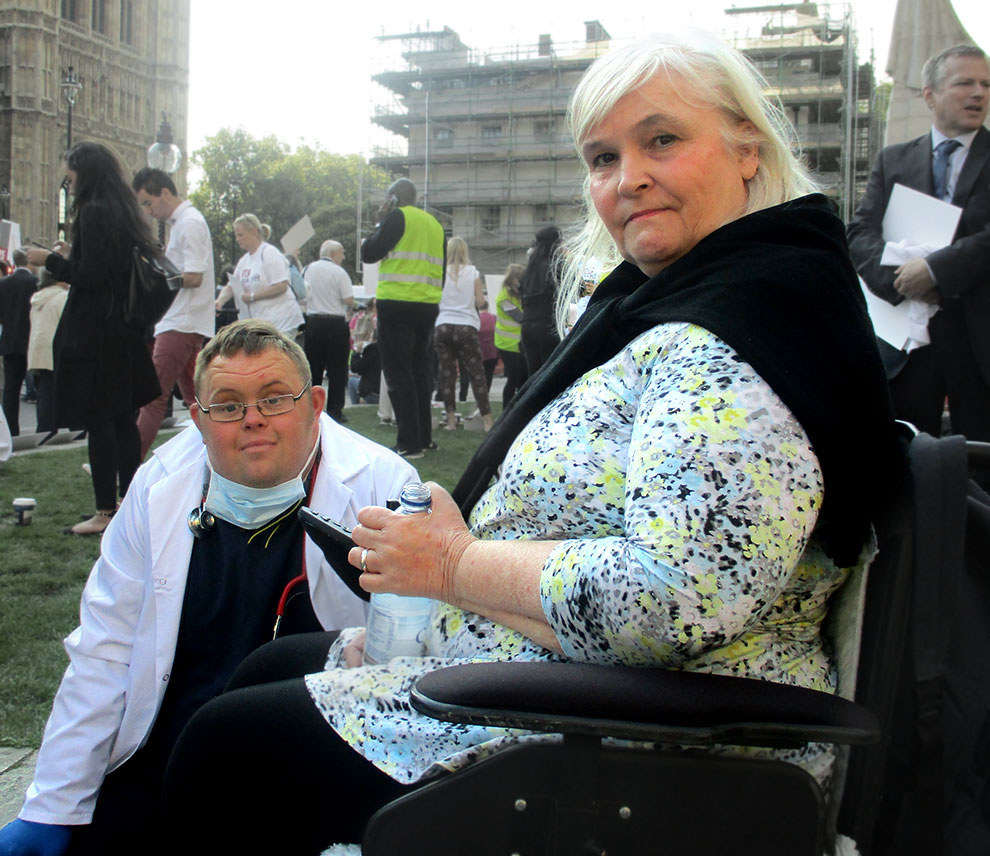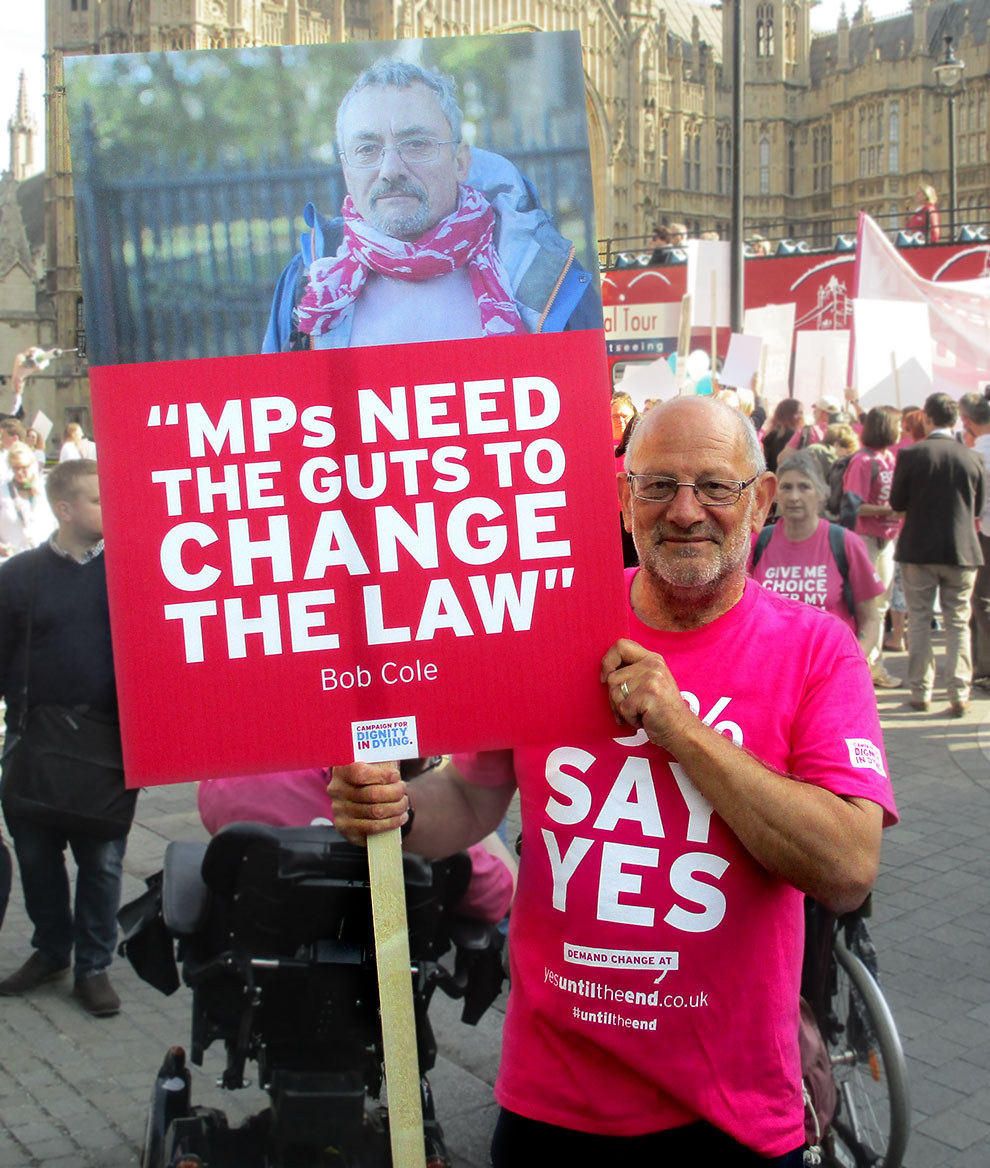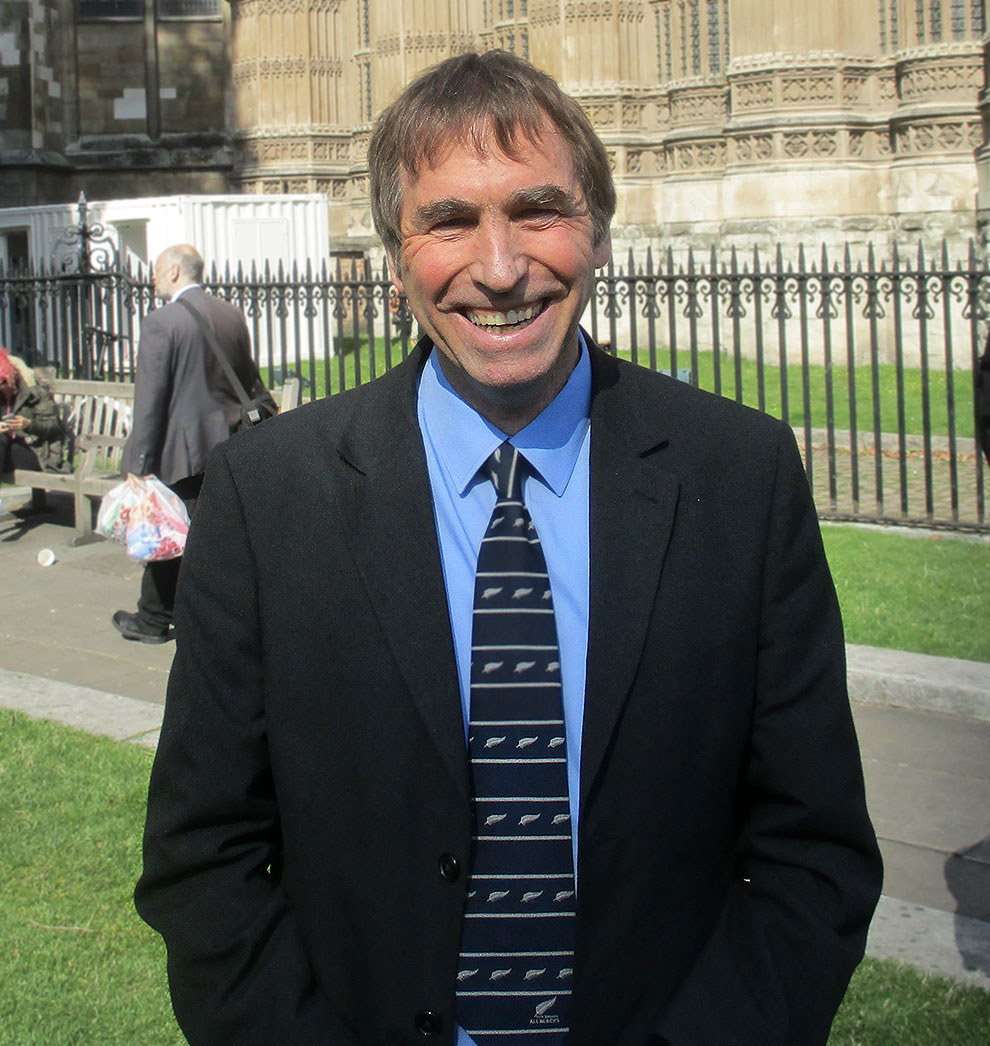
There are two demonstrations going on right next to each other outside the houses of parliament. One has white and red placards saying things like "Don't give doctors a licence to kill" and "Do no harm. Vote No". The other is all in pink, and has slogans like "The current law is broken" and "Demand change".
The two groups are out to make their voices heard as MPs vote in the House of Commons on the assisted dying bill, which would take Britain a step closer to allowing terminally ill people to choose to end their lives with the help of a doctor. The white and red faction has brought a giant papier mâché judge, looking like a vast Mr Punch, which is carrying a syringe. On top of his wig it says "Beware the slippery slope". It is incongruously comic, like a prop in a student play.

The two demos are practically on each other's toes; the line between the two is not clearly delineated, and along the disputed border there's a mixed zone where you could easily be taken for being on the other side. Given the huge import of the issue and the irreconcilable nature of the two sides, you'd expect friction, possibly even outright hostility. But in a weird way, the saddest thing about the whole scene is how compassionate and understanding of their opponent's views each side is.
"There are very compelling arguments over there," Sara Burns tells me, gesturing towards the white and red placard group. She's a delicate-featured woman in early middle age wearing lipstick that matches the hot pink of her "Give me choice over my death" T-shirt. "People are very afraid that they're going to be culled, or euthanised, and whatever. But this bill isn't about that. If it was, I would be the first to have a placard, to support the disabled or the elderly who'd be worried about being euthanised. I don't think our country will ever, ever go for that. That crossing of the Rubicon, the slippery slope, no way. They're very different things."
Burns is here for a simple reason. "The bill personally affects me," she says, "because I am currently being treated for recurring, very aggressive, triple-negative breast cancer, and I've been told that I won't be cured. At the moment they're managing it, but eventually it will be terminal." Her silver hair is cropped to half-inch buzz-cut length, and is thin enough for her scalp to be clearly visible.
For her, the assisted dying bill represents a backstop, a way out she hopes she'll never have to take. "My biggest fear is something that may never come to pass, which is that, despite great palliative care and pain medicine, it won't be sufficient, which unfortunately sometimes happens. I worry about that now.
"I would just rather have this bill in place, which has these really good safeguards that won't be abused. I'd have peace of mind, so I could make that choice, if needs be, and speed things along. It's not suicide. It's about speeding along a death when you're really, really suffering, and you've had enough of that suffering."

Less than 30 yards from where she's standing, I meet Nikki Kenward, a Shropshire native and the founder of the anti-euthanasia group Distant Voices. She is in a motorised wheelchair; after being struck by Guillaume-Barre syndrome in 1990 at the age of 37, she was entirely paralysed, locked in, for five months, and couldn't move her arms for two years. She's with her friend Charlie Brick, a young man with Down syndrome who is wearing a lab coat that says "Ending not mending" on the back. Of course she understands the pain that people like Burns are going through, she says. But she doesn't trust the safeguards the bill has in place.
"We don't do safeguards," she says. "If we did safeguards, what happened in Rotherham and Bristol and Oxford? We're no good at safeguards. You name me one public organisation that has safeguards that you'd say they work. I would challenge you to do that. We're no good at it. It's too dangerous. Because we're human."
You can't have a conversation here without Oregon coming up. In 1997, the US state made it legal for patients with less than six months to live to get a prescription for a drug which they could then take at any time of their choosing. For supporters of the British bill, which is explicitly modelled on the US state's Death With Dignity Act, the Oregon experience has been a success. In 2014, 155 people were given the lethal prescription; a total of 105 actually used it, while the other 50 died with it still in the bathroom cabinet.
Both of those numbers have been going up steadily each year – in 1998, the first year it was available, they were 24 and 16; in 2007, it was 85 and 49. But it's still a tiny fraction, a little over 0.3%, of the total number of deaths in the state. "I'm encouraged by what happened in Oregon," says Burns. "Although it's available, only very few people use it. They know it's there, but very few take it up, and they have very stringent rules."

But opponents mention darker stories: Kenward, for instance, talks about the undeniably awful cases in 2009 when the Oregon Medicaid state insurance system told two patients that they would not pay for further treatment of their disease but would pay for the lethal prescription. "When you create this principle, economic factors come to bear," says Dr Peter Saunders, a former surgeon and the chief executive of the Christian Medical Foundation. "If you make assisted suicide a therapeutic option, there will be an obligation to use it, to reduce costs for the health service."
This will be especially sharp in a time of government cutbacks, he says: "We know that over half of all of healthcare spending goes on people in the final six months of life. A ComRes poll this morning found that 86% of people said they thought that politicians and healthcare managers would prioritise assisted suicide as a cheaper option than palliative care, chemotherapy, radiotherapy, cancer surgery."
What both sides acknowledge is that assisted suicide is going on right now. I speak to Mick Murray, a soft-spoken Derbyshire man in his fifties. "I'm here in memory of my friend Bob Cole, who died in the final stages of asbestos lung cancer in terrible pain which the doctors simply couldn't get rid of," he says. "He had three months to live, and in the end he decided to go to the Dignitas clinic in Switzerland. I helped arrange it, and I went with him and supported him. That was on 14 August. I'm here in his memory, and because I'm proudly committed to this."

The perversity is, he says, that by going – by helping his friend to end his pain, as his friend expressly wanted – he, Murray, put himself at risk of prosecution, even jail. "By going to Switzerland, I potentially committed a criminal act. My friends and I who accompanied him did so out of compassion and kindness. He died gracefully. The tragedy is he couldn't do it at home, and we couldn't do it without fear of prosecution. This is a crazy law which needs changing."
Cole's story does sound especially horrible. "He got more and more ill," Murray says, "and in such terrible pain, curled up in pain – he once said, 'I think my chest is on fire.' Slapping cocaine patches on, such a heavy dose of morphine that his eyes were going around in different directions. And then he said, 'I think it's time to go.'"
To pile tragedy upon tragedy, Cole's wife had herself died at Dignitas just 15 months earlier, with her husband by her side. "She had progressive supranuclear palsy. She couldn't feed herself, she couldn't dress herself, she couldn't do anything. She was still compos mentis, and the prognosis for her was that she would get pneumonia, or her tongue would suffocate her because she could no longer control it." She had to go to Switzerland while she was still fit enough to travel.
Murray won't quite say whether this meant she had to end her days sooner than she would like. A couple of years ago I spoke to Terry Pratchett, the late, great fantasy author who became a campaigner for the right to die in later life. He was furious that a man he'd known, Peter Smedley, had had to go to Dignitas while he was still physically capable of doing so. "Frankly, Mr Smedley would probably be with us now, if he hadn't had to go to Switzerland to do it," Pratchett said. "And that's why I hate the people who try to get in the way of this."
Burns agrees. "The Dignitas route speeds people's deaths," she says. "I'd have to book it in long before I was ever ready to go. I may never need this bill, but [without it], because of my fears, I might book it in and shorten my life unnecessarily."
There's also the expense. "I'm lucky enough that I could afford to even consider it," says Burns. Others couldn't. Murray: "It costs a lot of money to go to Switzerland. The fees from Dignitas are about £7,000, then you've got to pay for transport, and you've got to pay for hotels because you have to be seen by a doctor. The total cost was something like £12,000. It's not a right that everybody can have here. It's only if you're relatively well-off. There's something wrong here. Something profoundly wrong."

But Saunders warns that moving the line would make the law hard to defend. "If you're trying to defend a country, the best way to do it is to put your national boundaries along geographical features, like coastlines, rivers, mountain ranges," he says. "In the same way, laws are best protected if they give a clear blanket prohibition on certain actions, and allow the prosecutors and judges to show compassion in hard cases. Can we imagine a speeding law which says you can only travel at 70 miles per hour unless you're late for an appointment or happen to be an MP? It would be utterly unworkable."
Judges and prosecutors have room for compassion in the current system, he says, and the small number of cases suggest that it is working: "In any democracy, we expect and understand that there are limits to human choice and freedom. Every law stops some people doing something they might otherwise desperately want to do. But legislators draw laws in order to protect vulnerable people from exploitation and abuse."
Kenward agrees: "You cannot pretend that a momentous decision and change like this won't affect other people. It will." I ask her what she would say to Mick Murray, home from Switzerland without his friend. "What I would say is, let us put all our energy into getting the right palliative care, the right love, the right support for your family," she says. "I want people to have as much care and support as is humanly possible." What she worries is that you can't have an assisted dying law and, at the same time, full commitment to palliative care. "If you give medical people and others this weapon," she says, "they will use it."
Everyone at the twin demos is passionate and committed, although there is something slightly strange about the way the opposing press officers seem to be competing to bring ever more tragic cases in front of the waiting journalists, in a sort of oneupmanship of sadness. And both sides seem to be entirely aware of the difficulty of the question and the power of their opponents' arguments. "We need a homegrown law that safeguards all those people," Murray says, gesturing at the other protest. "Those people are concerned about their rights. We ought to look after elderly people. We ought to have a culture which puts safeguards and checks in place so they don't feel threatened."
As the demos go on, inside the House of Commons the debate continues – one MP, Madeleine Moon, cries in the chamber at the memory of her husband's death from motor neurone disease. Then, in the early afternoon, after I've left, there is a vote, and the motion is resoundingly defeated by 330 votes to 118. It was never likely to pass – it was a private member's bill rather than one backed by the government – but the scale of the defeat means it is unlikely to be discussed again for at least five years.
The red and white placards will be going home happy. But I can't help thinking of Sara Burns and how she's feeling right now.
